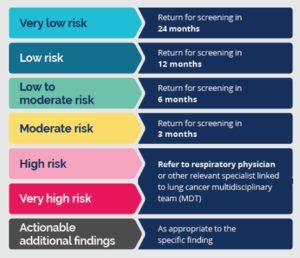National Lung Cancer Screening Program
The National Lung Cancer Screening Program (NLCSP) commences on 1 July 2025 and is expected to save approximately 12,000 lives over the next 10 years.
Lung cancer is the leading cause of cancer death in Australia, claiming more lives than breast and prostate cancers combined. In 2024, it is estimated that there were more than 15,000 new cases of lung cancer and approximately 9,000 deaths from lung cancer in Australia.
Currently, the majority of lung cancer cases are diagnosed at late stages (3 and 4), with only 26% of people with lung cancer surviving five years post-diagnosis. However, if found early, lung cancer can be successfully treated.
Large international randomised trials have shown that screening using a low-dose CT chest scan can reduce lung cancer deaths by at least 20% and can detect up to 70% of lung cancers at early stages.
Screening regularly with low-dose computed tomography (CT) chest scans is the best way to detect lung cancer early.
The National Lung Cancer Screening Program (NLCSP) is a targeted screening program available for eligible people who:

- are aged 50 to 70 years, AND
- have no symptoms or signs that suggest lung cancer (for example, unexplained persistent cough, coughing up blood, shortness of breath for no reason), AND
- smoke tobacco cigarettes or have a history of cigarette smoking (having quit within 10 years), AND
- have a history of tobacco cigarette smoking of at least 30 pack-years (for example, a pack a day for 30 years, or 2 packs a day for 15 years).
Along with expert lung cancer specialists at Cabrini Health, Dr Hari Wimaleswaran (Respiratory Physician, clinical lead NLCSP, Cabrini Health) will be assisting High Risk and Very High Risk patients who meet the criteria with rapid assessment, diagnosis and treatment. He is also able to review any severe lung abnormalities incidentally found via the screening.
Please send referrals to lungscreening@cabrini.com.au.
Our lung screening nurse consultant Angie Lutjen will be a pivotal liaison between primary practice/GP’s and lung cancer specialists as well as providing support for lung cancer patients.
Visit the Government website for further information
